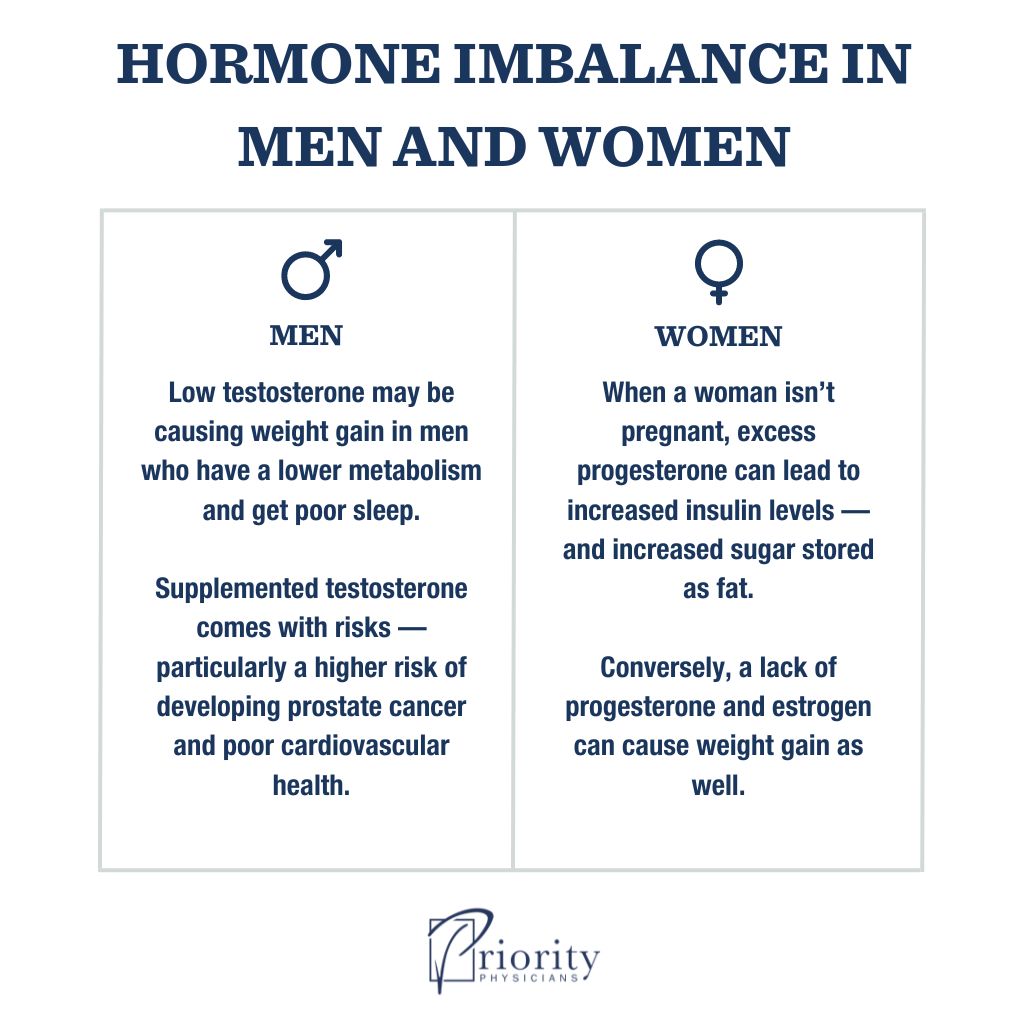Sometimes it feels like extra weight appears out of nowhere.
Maybe you’re chugging along as usual, maintaining your usual routine and lifestyle, and suddenly, you gain a little weight. This is a common and early warning sign that your hormones are imbalanced.
To be clear, what we’re talking about is a sudden weight gain of five to 10 pounds accompanied by other symptoms (hair loss, feeling cold all the time, skin changes, etc.), not a weight gain of 30–40 pounds. If you’ve been eating poorly or stopped exercising and you notice significant weight gain, those lifestyle factors are probably responsible.
However, if all other variables have remained constant over time, it’s not unrealistic to ask, “Can a hormone imbalance cause weight gain?”
Types of Hormone Imbalances
The type of hormone imbalance you might experience is largely dependent on your gender, but there are some that affect both men and women. The most common is hypothyroidism.
Your thyroid is your body’s internal regulator, influencing body temperature, weight, hair growth, and more. Hypothyroidism happens when your thyroid is underactive and produces less of the essential hormones your body needs.
Hypothyroidism is slightly more common in women than men, but age is a risk factor in both genders. There’s even some thought that age-related weight gain could be related to the slow decline of thyroid function over time.
An imbalance of pituitary hormones and growth factor hormones can play a role in weight gain as well, but they are far less common culprits.
Hormone Imbalances in Men
Low testosterone may be causing weight gain in men who have a lower metabolism and get poor sleep. Supplementing testosterone through hormone replacement therapy initially leads to more weight gain because it increases muscle mass, but this is only temporary.
Muscle naturally weighs more than fat. You might go through an awkward stage during treatment where your weight increases — until, of course, the muscle you’re developing becomes more metabolically active and burns more calories at rest. At that point, your weight should decrease.
Of course, supplemented testosterone comes with risks — particularly, a higher risk of developing prostate cancer and poor cardiovascular health.
Hormone Imbalances in Women
Hormone imbalances are a bit more complicated in women because of the natural shifting of hormones during the menstrual cycle — particularly progesterone and estrogen.
Progesterone levels dominate estrogen levels in the second half of the menstrual cycle. Progesterone is the pregnancy hormone, and it can interact with your body’s insulin levels to make sure enough nutrients are delivered to a growing baby.
But, when a woman isn’t pregnant, excess progesterone can lead to increased insulin levels — and increased sugar stored as fat. Excess progesterone can also impair your body’s ability to regulate its blood sugar, which can make losing weight harder in the last two weeks of your cycle. Sometimes, just being on birth control can balance the big hormone swings that lead to weight gain.
Conversely, a lack of progesterone and estrogen can cause weight gain as well.
When women go through menopause, their ovaries stop making estrogen and progesterone. Not only is that often accompanied by weight gain, it’s also often characterized by the redistribution of fat to different places in the body — a double whammy.
When Is Weight Gain a Medical Concern?
So, can a hormone imbalance cause weight gain? Yes — but determining how much weight qualifies as a notable gain is a loaded question. It truly varies from person to person.
For example, a five-pound gain might be noticeable on a five-foot-tall person, but imperceptible on someone who’s six feet tall.
From my perspective, a sudden increase in five to 10 pounds would be enough for me to investigate. But I want to emphasize that if weight gain is mentally bothering a patient, no matter how minimal, I’ll always investigate further.
What Are the Next Steps for Suspected Hormonal Weight Gain?
Fortunately, all these hormones are easy to test through blood work.
There are some quick, non-fasting labs that can tell us where your levels are. There’s some variation here as well — for example, because testosterone levels are the highest right before waking up, men will have more testosterone at 9 a.m. than at 5 p.m.
Because of day-to-day, hour-to-hour variations in hormone concentrations, if you get an abnormal result, we’ll wait a few weeks before rechecking. Once we get two sets of labs that have abnormal results, I’ll recommend you go ahead with treatment.
So, while yes, a hormone imbalance can cause weight gain, don’t worry — you can work together with your physician to identify and address it!


